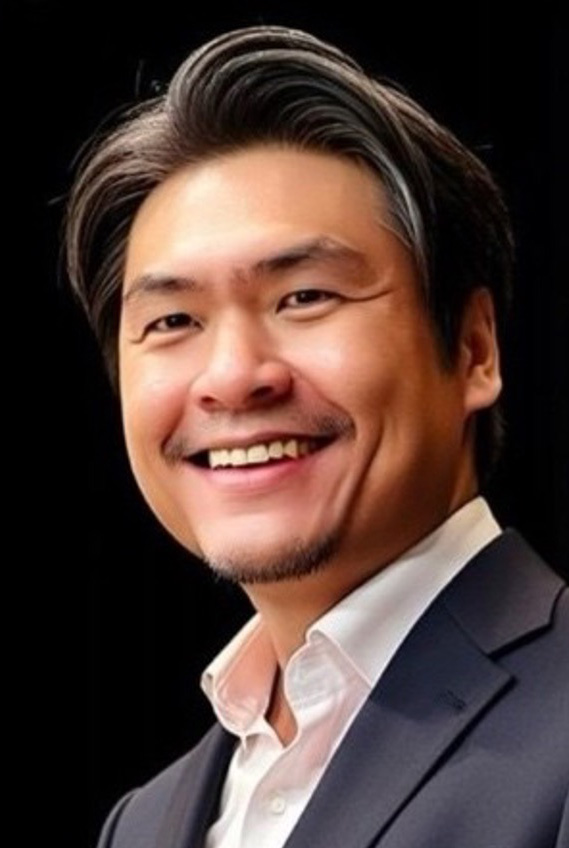By Tuck Executive Education
22 January 2025

Ivin Lim TEE’24 attends the Leaders as Architects class with Tuck professor Adam Kleinbaum during the summer 2024 Advanced Management Program at the Tuck School of Business. | Photo by Rob Strong
Introducing Tuck Leadership Insights, a new series from Tuck Executive Education at Dartmouth’s Tuck School of Business. In this feature, senior leaders who have participated in Tuck’s programs share the challenges they are tackling, the innovations impacting their work, and their advice for today’s—and tomorrow’s—leaders.
In this inaugural feature, we sit down with global finance executive Ivin Lim TEE’24 who recently attended Tuck’s Advanced Management Program (AMP). Below, Ivin—who was recently named CFO, Asia Pacific, at Arup—reflects on transitioning to his new role, the leadership practices that inspire him, and how his time at Tuck shaped his perspective on leading with purpose and authenticity.
What’s top of mind for you right now? What issue are you trying to solve?
As the Chief Financial Officer, Asia Pacific at Arup, my current focus is on preparing for a seamless transition into the role. A priority is understanding the unique challenges and opportunities within the region to align financial strategies with our vision of shaping a more sustainable world.
Top of mind is fostering leadership that leverages the diversity of the Asia Pacific region. With its broad range of cultures, markets, and perspectives, the region offers an incredible opportunity to enrich decision-making and inspire innovation. My focus is on building a collaborative culture where individuals feel empowered to contribute their unique strengths and insights. This leadership approach drives not only organizational success but also meaningful impact for the communities we serve.
Additionally, I’m focused on strengthening the role of finance as a partner in driving growth, fostering collaboration, and creating value for clients and communities. These are the key questions and opportunities I am preparing to tackle as I formally step into the role.
What advice do you have for leaders looking to transition into an executive role?
Transitioning into an executive role requires a shift in mindset, where leadership is about setting strategic direction and inspiring your team rather than managing day-to-day operations. My key advice is:
- Develop a Holistic, Strategic Perspective
As an executive, it’s essential to think beyond your functional area and understand the full scope of the business. Engage with other departments, connect the dots between different functions, and align your efforts with the organization’s long-term goals. - Lead with Emotional Intelligence and Vision
Leadership at the executive level is about more than just making decisions; it’s about inspiring others, fostering collaboration, and motivating your team with a shared sense of purpose. Cultivate strong relationships, listen to diverse perspectives, and be empathetic to the needs of your team. - Make Data-Driven, Bold Decisions
As an executive, your decisions will impact the entire organization. Making data-driven decisions ensures that your choices are well-informed, aligned with the organization’s objectives, and grounded in facts, which can lead to more effective and sustainable outcomes. - Commit to Continuous Learning
The challenges you’ll face as an executive will evolve, so embracing a mindset of lifelong learning is essential. Seek regular feedback, actively work on developing your leadership skills, and surround yourself with mentors who can provide guidance and perspective.
Ultimately, success in an executive role is about empowering your team, fostering a culture of collaboration, and staying adaptable while keeping a clear vision for the future.
“Leadership is not about performing a role—it’s about being genuine and transparent, even when it’s difficult.”
What advice do you have for the next generation of leaders?
To the next generation of leaders, my advice is to lead with purpose, curiosity, and resilience. Leadership is about inspiring others, fostering collaboration, and creating positive impact. The next generation of leaders has the opportunity to shape a future that is inclusive, sustainable, and purpose-driven. Here are a few principles I would recommend:
- Stay Curious
The world is constantly evolving, and great leaders are those who never stop learning. Embrace every opportunity to grow, whether through formal education, reading, or engaging with people from different fields and backgrounds. Don’t limit yourself to your own area of expertise—broaden your knowledge across disciplines to help yourself think more creatively and adapt quickly to change. - Build Trust
Building trust is the foundation of effective leadership, and this can only be achieved by staying true to your values and principles. Lead by example, be open in your communication, and show consistency between your words and actions. When you are authentic, others feel empowered to do the same, creating a culture of trust and respect. - Embrace Failure
Embrace failure as a learning opportunity, rather than something to avoid or fear, because it’s through failure that we gain the insights needed to succeed in the future. A resilient leader is one who remains calm under pressure, reflects on their mistakes, and adapts their strategies to overcome obstacles. This mindset not only helps you grow but also encourages your team to take risks, innovate, and learn from their own experiences.
“Building trust is the foundation of effective leadership, and this can only be achieved by staying true to your values and principles.”
How do you foster good mental health and wellness?
Fostering good mental health and wellness requires a holistic approach that balances mind, body, and spirit. For me, there are three key areas I focus on to maintain overall well-being:
- Prioritize Physical Health
Physical health is foundational to mental wellness. I make sure to integrate regular physical activity into my routine—whether through strength training, cardio, or simply taking walks. Exercise has been shown to reduce stress, improve mood, and enhance cognitive function. I also focus on getting enough rest and eating a balanced, nutritious diet. Taking care of my body helps me stay mentally sharp and energized throughout the day. - Engage in Creative Expression
Creative expression, whether through music, writing, or art, offers a valuable outlet for managing stress and enhancing mental health. I find that these activities provide a space to reflect, process emotions, and tap into my creativity. Engaging in something I’m passionate about allows me to recharge mentally and express myself in ways that words sometimes can’t capture. - Foster Meaningful Connections
Maintaining strong social connections is crucial for both mental and emotional well-being. I make time to nurture relationships with family, friends, and colleagues, ensuring that I have a strong support system. Being able to lean on trusted individuals during difficult times, or simply having someone to share positive moments with, is key to feeling balanced and supported.
Is there a quote or mantra you live by or refer back to?
A quote that I often refer back to comes from Albert Einstein:
“In the middle of difficulty lies opportunity.”
This quote resonates deeply with me. It’s a reminder that challenges and setbacks are often where growth and innovation are born. Instead of viewing difficulties as obstacles, I’ve learned to see them as chances to learn, adapt, and create solutions. We have the power to turn adversity into a catalyst for positive change and progress. The most rewarding moments in my career have often come from navigating tough situations, and remembering that helps me stay focused on finding opportunities, even when things seem difficult.

During AMP, participants have the opportunity to attend a coaching session with a professional rower on the Connecticut River which runs through the heart of Tuck and Dartmouth’s campus. | Photo by Rob Strong
ON TUCK’S ADVANCED MANAGEMENT PROGRAM
What were your top takeaways from your Advanced Management Program experience at Tuck?
Three key takeaways stand out:
- The Power of Reflection in Leadership
One of the most important lessons from AMP was the emphasis on reflective leadership. Through Tuck professor Vijay Govindarajan’s Three-Box Solution frameworks, I learned the value of taking a step back to critically evaluate decisions and align actions to create the future while driving long-term organizational goals. This practice of reflection has since helped me become a more intentional leader, balancing immediate needs with long-term vision. - The Importance of Adaptive Strategies
The program underscored the need to lead with agility in today’s rapidly evolving business landscape. Whether it was through discussions on disruptive innovation or global market complexities, AMP taught me how to develop adaptive strategies that balance immediate performance needs with the flexibility to pivot as circumstances change. This lesson is particularly relevant as I prepare to lead in a dynamic, diverse region. - The Value of a Diverse Network
One of the greatest strengths of the Tuck experience was the opportunity to connect with leaders from a wide range of industries and geographies. Collaborating with peers who brought different perspectives and experiences challenged my thinking and enriched my approach to problem-solving. This network continues to be a source of inspiration and support as I navigate complex leadership decisions.
The AMP reaffirmed my commitment to lifelong learning and leadership development, equipping me with the mindset and tools to lead with purpose, resilience, and impact.
“Whether it was through discussions on disruptive innovation or global market complexities, AMP taught me how to develop adaptive strategies that balance immediate performance needs with the flexibility to pivot as circumstances change.”
During AMP, participants had plenty of classroom time, but also had a chance to row on the Connecticut River and make pizzas at King Arthur Flour. Talk us through these experiences. What were your takeaways? Any key moments that stuck with you?
The blend of classroom learning and experiential activities during AMP was one of the highlights of the program. It provided a balance of intellectual engagement and hands-on experiences, which helped reinforce the leadership lessons we were learning.
Rowing on the Connecticut River was a memorable experience that tested our ability to work as a team under pressure. In a leadership role, we often need to steer through challenges while ensuring that the team remains aligned and coordinated. Rowing required precise coordination and communication. It was a perfect metaphor for leadership: each individual’s effort matters, but success depends on synchronizing efforts to achieve a common goal. The experience reminded me that effective leadership involves guiding the team while creating space for each person to contribute in their own way.
Making pizzas at King Arthur Flour was another unique experience. It may seem lighthearted, but it was an exercise in artistry and attention to detail. In the kitchen, as in business, we had to navigate both structure and flexibility—following the recipe but also adapting to unexpected challenges like ingredient availability and physical constraints. It highlighted the importance of balancing creativity and consistency in order to achieve the desired results, while creating joy and fostering a positive spirit at the same time.
The key takeaway from both activities was the importance of building strong, trusting teams that can collaborate effectively, whether in a high-stakes business environment or in more casual, social settings. It reaffirmed the idea that leadership isn’t just about setting the course—it’s about fostering an environment where people feel empowered to contribute and succeed together.

Ivin Lim is a global executive with over 20 years of experience in finance and leadership. He is the Chief Financial Officer, Asia Pacific at Arup. Prior to that, Ivin held leadership roles at some of the world’s most respected organizations, including JLL and Standard Chartered Bank. Additionally, he had the honor of serving as a commissioned officer in the Army, where his leadership and commitment to excellence were tested and refined. With a passion for transforming insights into actionable strategy, Ivin thrives on driving organizational change, fostering collaboration, and shaping strategies that have a lasting impact in building a better world.
